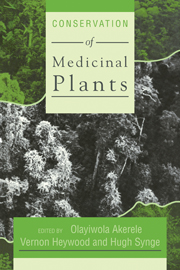Book contents
- Frontmatter
- Contents
- Contributors
- Preface
- Acknowledgements
- The Chiang Mai Declaration
- Introduction
- The Issue of Medicinal Plants
- Science, Industry and Medicinal Plants
- Techniques to Conserve Medicinal Plants
- Policies to Conserve Medicinal Plants
- 15 Policies and Organisation for Medicinal Plant Conservation in Sri Lanka
- 16 Experience in the Conservation of Medicinal Plants in Sri Lanka
- 17 The Conservation of Medicinal Plants Used in Primary Health Care in Thailand
- 18 Medicinal Plants and the Law
- 19 Let's Stop Talking to Ourselves: The Need for Public Awareness
- 20 Germplasm, Genetic Erosion and the Conservation of Indonesian Medicinal Plants
- Experiences from Programmes to Conserve Medicinal Plants
17 - The Conservation of Medicinal Plants Used in Primary Health Care in Thailand
Published online by Cambridge University Press: 07 September 2010
- Frontmatter
- Contents
- Contributors
- Preface
- Acknowledgements
- The Chiang Mai Declaration
- Introduction
- The Issue of Medicinal Plants
- Science, Industry and Medicinal Plants
- Techniques to Conserve Medicinal Plants
- Policies to Conserve Medicinal Plants
- 15 Policies and Organisation for Medicinal Plant Conservation in Sri Lanka
- 16 Experience in the Conservation of Medicinal Plants in Sri Lanka
- 17 The Conservation of Medicinal Plants Used in Primary Health Care in Thailand
- 18 Medicinal Plants and the Law
- 19 Let's Stop Talking to Ourselves: The Need for Public Awareness
- 20 Germplasm, Genetic Erosion and the Conservation of Indonesian Medicinal Plants
- Experiences from Programmes to Conserve Medicinal Plants
Summary
In Thailand, people are close to nature. They know how to use herbs and plants both as food and medicine and teach this to their children. Over many centuries of experience they have developed a form of traditional medicine, suitable for their own health care and well accepted by them. It has certain advantages over imported systems of medicine in our setting because, as an integral part of the people's culture, it is particularly effective in solving certain cultural health problems. It can and does freely contribute to scientific and universal medicine. Its recognition, promotion, and development would secure due respect for our people's culture and heritage.
The provision of traditional remedies and medicinal plants in a health care system is not second-rate medicine but is part of the national scene with its well-established health care system for the people. It is like a traditional art which has high potential in the qualities and properties of the skills and drugs used. “Health for All” is regarded in Thailand as a broad concept of steady and widely diffused improvement of society as a whole, based on health as a primary need for happiness and well-being. It is consistent with the cherished values and traditions of our nation, the monarchy, and our religious institutions, but emphasizes the urgent needs and rights of the vast majority of the rural poor and other disadvantaged groups.
To help these poor people to stand on their own feet, a pilot project on primary health care was initiated in one district of Chiang Mai Province in 1969.
- Type
- Chapter
- Information
- Conservation of Medicinal Plants , pp. 253 - 258Publisher: Cambridge University PressPrint publication year: 1991
- 1
- Cited by



